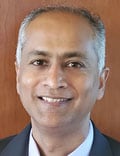Sleep is a “biological necessity” that is “essential to health” ― and inadequate sleep and untreated sleep disorders are detrimental for health, well-being, and public safety, the American Academy of Sleep Medicine (AASM) says in new position statement.

Dr Kannan Ramar
“While awareness of the value of sleep has risen in the last decade, education about how to achieve healthy sleep and treat sleep disorders is overall lacking in the general public,” Kannan Ramar, MBBS, MD, immediate past president of the AASM and practicing sleep medicine specialist at the Mayo Clinic, Rochester, Minnesota, told Medscape Medical News.
Federal data from the Centers for Disease Control and Prevention (CDC) indicate that about one third of children and adults ― and three quarters of high school students ― fail to get an adequate amount of sleep on a regular basis.
Time to Talk About Sleep
“Dubbed a ‘public health problem’ by the CDC, research continues to suggest chronic, insufficient sleep and untreated sleep disorders are linked to increased health and safety risks such as cardiovascular disease, diabetes, obesity, workplace accidents, and motor vehicle crashes,” Ramar said.
“The AASM’s Sleep is Essential to Health Position Statement addresses the significant need for greater emphasis on sleep health in public health promotion, clinical practice, inpatient, and long-term care,” he told Medscape Medical News.
The statement was published online June 21 in the Journal of Clinical Sleep Medicine and has been endorsed by more than 25 medical, scientific, patient, and safety organizations.
In the statement, the AASM recommends that sleep education have a “prominent place” in K–12 and college health education, medical school and graduate medical education, and educational programs for other health professionals.
It says healthy sleep should be targeted by public health and workplace interventions to improve health-related outcomes and that behaviors that help people attain healthy sleep should be actively promoted.
In addition to adequate sleep duration, healthy sleep requires sleep of good quality, appropriate timing, regularity, and the absence of sleep disorders, the statement notes.
“Clinicians should start a conversation to educate their patients on the importance of healthy sleep and what it encompasses,” Ramar advises.
“In addition to promoting general sleep education, doctors should also routinely inquire about sleep habits and investigate any symptoms of sleep disorders. Hospitals and long-term care facilities should optimize sleep conditions,” he suggests.
To achieve better sleep, the AASM offers the following healthy SLEEP tips :
S ― Set boundaries for blue light exposure. Consider setting a technology curfew by turning off the TV and other electronic devices 30 to 60 minutes before bedtime. Silence notifications and charge devices away from the bed to help curb temptations to check social media or news alerts.
L ― Limit alcohol, caffeine, and large meals before bedtime. Avoid consuming caffeine after lunch and avoid alcohol near bedtime, because both can disrupt sleep. If hungry after dinner, keep snacks small, nonsugary, and easily digestible to avoid disrupting sleep.
E ― Establish a bedtime and morning routine. Consider developing a nightly routine that evokes calm and relaxation. This may include reading, journaling, or meditating. For those working remotely, allow ample time to wake, reflect, and prepare for the day ahead.
E ― Ensure that the bedroom is a designated space for sleep. Limit noise and distractions by making the bedroom quiet, dark, and a little bit cool, and only use the bed for sleeping, not watching TV or reading.
P ― Pursue support. People who experience ongoing sleep problems can visit SleepEducation.org and enter their ZIP code to find a board-certified sleep physician at an AASM-accredited sleep center in their area.
“Healthy sleep is as important as proper nutrition and regular exercise for our health and well-being, and sleep is critical for performance and safety,” Ramar said in a news release.
“It is the position of the AASM that sleep is essential to health, and we are urging educators, health care professionals, government agencies, and employers to prioritize the promotion of healthy sleep,” he added.
The research had no commercial funding. Ramar has disclosed no relevant financial relationships.
J Clin Sleep Med. Published June 21, 2021. Abstract
For more Medscape Neurology news, join us on Facebook and Twitter.
Source: Read Full Article
